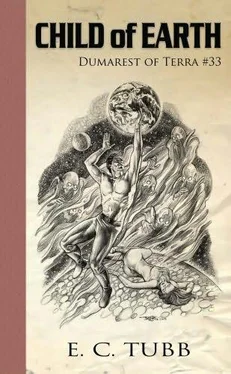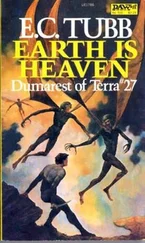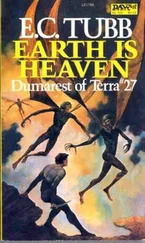E. Tubb - Child of Earth
Здесь есть возможность читать онлайн «E. Tubb - Child of Earth» весь текст электронной книги совершенно бесплатно (целиком полную версию без сокращений). В некоторых случаях можно слушать аудио, скачать через торрент в формате fb2 и присутствует краткое содержание. Жанр: Фантастика и фэнтези, на английском языке. Описание произведения, (предисловие) а так же отзывы посетителей доступны на портале библиотеки ЛибКат.
- Название:Child of Earth
- Автор:
- Жанр:
- Год:неизвестен
- ISBN:нет данных
- Рейтинг книги:4 / 5. Голосов: 1
-
Избранное:Добавить в избранное
- Отзывы:
-
Ваша оценка:
- 80
- 1
- 2
- 3
- 4
- 5
Child of Earth: краткое содержание, описание и аннотация
Предлагаем к чтению аннотацию, описание, краткое содержание или предисловие (зависит от того, что написал сам автор книги «Child of Earth»). Если вы не нашли необходимую информацию о книге — напишите в комментариях, мы постараемся отыскать её.
Child of Earth — читать онлайн бесплатно полную книгу (весь текст) целиком
Ниже представлен текст книги, разбитый по страницам. Система сохранения места последней прочитанной страницы, позволяет с удобством читать онлайн бесплатно книгу «Child of Earth», без необходимости каждый раз заново искать на чём Вы остановились. Поставьте закладку, и сможете в любой момент перейти на страницу, на которой закончили чтение.
Интервал:
Закладка:
“He lied.” Shandaha sipped at his wine. “That is not how men die in the void.”
“I know that now. I didn’t then.”
Dumarest drew in his breath, remembering another time, another place when he had faced the frigid, mindnumbing vastness of the universe. A thing he had been forced to do; an experience he would never forget.
Shandaha, watching him, said, “The others?”
“Weren’t as bad but they were bored and I provided amusement. They teased me. I know now it was little more than a form of hazing. A ritual inflicted on most apprentices and novices. Cruel but basically harmless. But I was a boy, ignorant as you reminded me, helpless, insecure, terrified. No, it was not a happy time.”
“And then?”
“Most of what I did was to clean. The salon, cabins, the steward’s domain. Then I expanded into that of the handler, to the caskets in the hold, the hold itself. Zander was the engineer. One day he asked me to help him. He was busy with the generator and wanted it cleaned and checked for corrosion. Signs of failing insulation or extended wear. Basically it was routine maintenance. We talked as we worked, him telling me what to do and me doing it. Dorph, the steward„came in while we were at it. He didn’t like me helping the engineer. There was an argument that grew ugly. The captain intervened. After that things weren’t as bad.”
“You had made a friend.” Shandaha sipped more wine. “Did he teach you about engines?”
Dumarest leaned back, remembering the talk of components, the physics governing the establishment of the Erhaft field, the need for care, the danger if the field should collapse. A peril he had known and remembered too well.
“The engineer,” mused Shandaha. “The navigator too.”
“Yes.”
“The steward? No, he would not have been friendly. Yet what could he teach you aside from some basic first aid? Some medical techniques, perhaps. The use of a hypogun. The loan of a book on anatomy. How to attend to the needs of passengers. To prepare basic and simple meals. The handler? No. He could teach you even less.”
“You seem to have a tendency to underrate the abilities of others,” said Dumarest. “As you did Chagal. Because he hesitated to kill does not make him weak. Any fool can kill. It takes skill, knowledge, care and understanding to keep the sick alive and restore them to health. It also takes skill to keep a ship happy, the passengers content. The handler was a mine of information.”
“How could he be?”
Dumarest extended his hand. “Touch me and learn!”
“No. Tell me!”
Another command and one to be obeyed but Dumarest took his time doing it. Deliberately he concentrated on the past, searching his memories, seeing again the wizened face of the handler, the gleam of humor in Jesso’s eyes.
“Mostly the handler is in charge of the hold,” he explained. “He has to check the cargo, stack and restrain it and make sure the weight is evenly distributed. The caskets need regular maintenance and operating them is the handler’s responsibility. He also has to monitor those wanting to ride Low. He collects the passage money and does his best to make sure those wanting to travel are healthy enough to make it. No blame if they don’t but you can do without the clearing up.”
“Routine work,” said Shandaha. “Anyone of average intelligence could handle it. Is that all he taught you?”
“No.” Dumarest paused then added, “As I said it takes a special skill to keep a ship and passengers happy. Sometimes the steward has it or sometimes a specialist is hired. On the ship I was on, Jesso, the handler had it. He worked in the salon, at the table, entertaining the passengers. Gambling,” he explained. “Usually with cards. He was good at it.”
“And he taught you?”
“Yes.”
“A man of unusual talents.”
One who had been a friend. Dumarest saw his face, heard his voice, watched his hands as they moved over the table deftly manipulating the cards. Beginning with the basics, enjoying teaching a willing pupil, demonstrating the only safe way to cut a deck by drawing out the middle, setting it on the top, then cutting and stacking the cards.
The beginning of grueling lessons to gain hard-learned skill and hard-won ability. To know how to recognize markings, top and bottom dealings, forcing and hiding. How to read other players. To tell the genuine from the false. To sense a bluff.
To recognize a manipulator. A cheat. A sensitive. A coward.
Dumarest blinked and stared at a familiar room, goblets holding the dregs of lambent wine, the decanter glowing with emerald luminescence. The remembered face dissolved into the mists of time. A personal memory divorced from Shandaha’s influence. Yet it had seemed as real as if he had stepped back in time, as the goblet seemed real, the table, the room, the face and figure of his host.
“Interesting,” said Shandaha. “You seem to have had a most unusual education. One that has given you a variety of peculiar ideas.”
“About peculiar situations? Peculiar people?” Dumarest reached for his goblet, lifted it, studied the wine it held then drank and set down the empty container. “People like you, perhaps? I think you read my mind and didn’t like what you found. I didn’t think you would. Did you also learn that, aside from recognizing cheats and liars, I was also taught how to make a man betray himself?” Pausing he added, “A man-or a thing.”
“You go too far!”
“How far is too far?” Dumarest was blunt. “This is your game, Shandaha. Your rules-if there are any rules at all. Are we in an arena? Are you waiting for my attack? Poised to parry and attack in turn? Is this what it’s all about?”
“Chagal explained-”
“The doctor is not himself. You claim only to want entertainment by experiencing my memories. If we are to play then let the game be fair. You know I cannot lie yet you insist that what I remember could not have happened. So was it all a dream? Is it still a dream? Is all this merely an illusion.”
A question unanswered. Instead Shandaha said, “Oblige me, Earl, be so good as to pour us both more wine.” He waited until the goblets were full. “Why do you think your memories displease me?”
“Perhaps not my memories. Perhaps simply the truth.”
Dumarest waited until his host had sipped the wine, then lifted his goblet and drank and wondered if what he tasted was what the glass contained. “I once knew a woman who, when a young child, was sold to a religious order. She was fed and clothed and housed and was convinced she had lived a life of sublime luxury. The truth was the very reverse. The clothing was rags, the food rubbish, the shelter bleak. She had been conditioned, hypnotized, programmed to believe in a created illusion. Have I?”
“I have not lied to you.”
But if he had not lied he could still have hidden the truth. Dumarest remembered an incident in which to have told the bare truth would have cost him his life and to have lied the same. He had survived by treading the thin semantic path between truth and falsehood.
He said, “What is a lie? Would you believe I have the ability to walk on water? I assure you that I speak the simple truth.”
“Water,” said Shandaha. “You play a game, Earl. All can walk on water-if that water is ice. Your point?”
“Apparent lies can be the truth. Truth made an apparent lie. As apparent logic can be manipulated to prove anything you want.”
“If we syllogise,” agreed Shandaha. “To form a logical argument using three propositions; two premises and a conclusion that follows necessarily from them. As you have just demonstrated. Men can walk on ice. Ice is frozen water. Therefore men can walk on water. You wish to give another example?”
Читать дальшеИнтервал:
Закладка:
Похожие книги на «Child of Earth»
Представляем Вашему вниманию похожие книги на «Child of Earth» списком для выбора. Мы отобрали схожую по названию и смыслу литературу в надежде предоставить читателям больше вариантов отыскать новые, интересные, ещё непрочитанные произведения.
Обсуждение, отзывы о книге «Child of Earth» и просто собственные мнения читателей. Оставьте ваши комментарии, напишите, что Вы думаете о произведении, его смысле или главных героях. Укажите что конкретно понравилось, а что нет, и почему Вы так считаете.












